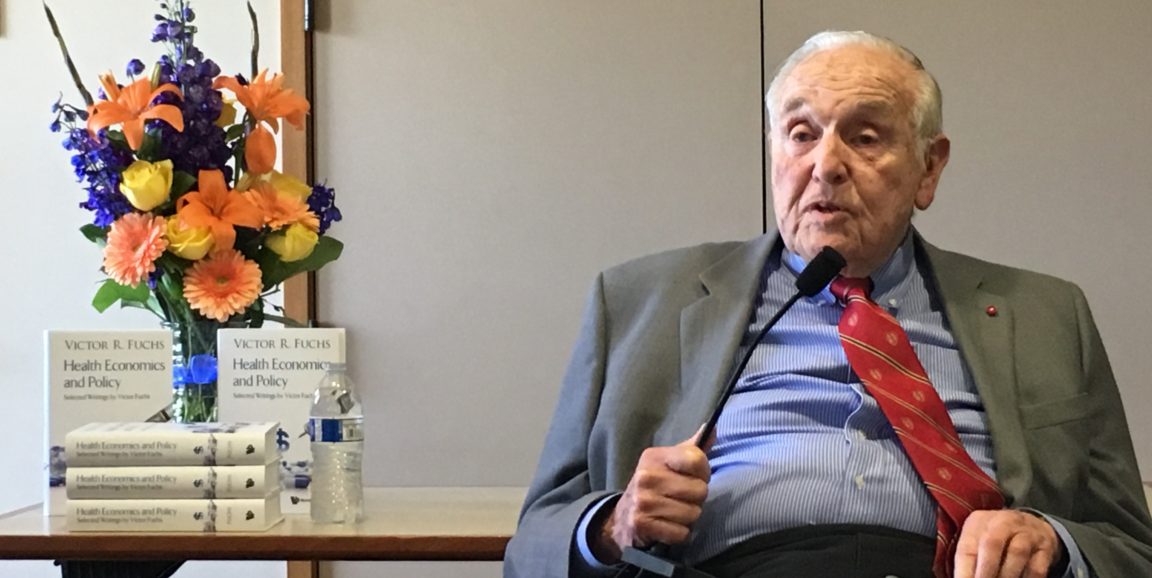On a recent afternoon, nearly 100 people gathered in an intimate room on campus to celebrate the release of a new book by Victor Fuchs, PhD, a Stanford professor of health research and policy and of economics, who is 94 years old.
"Vic has a better understanding of health care delivery in the United States than anyone," Dean Lloyd Minor, MD, said in his introduction. "And he has an amazing ability to write with analytical sophistication and rigor but also a lot of common sense."
Fuchs, accompanied by his grandson, stood behind a podium in the warm afternoon sun, sharing reflections on his career "riding two horses," as a multidisciplinary scholar in an era when academics rarely strayed from their own fields.
"In my 44 years at Stanford, many of my hopes for a joint appointment have been realized," Fuchs said, adding that he befriended numerous physicians, who kept him up-to-date about health care and technology and who also began to incorporate economic thinking into their work.
Holding appointments in two departments is not without its drawbacks, Fuchs joked, as it often requires attending more meetings and serving on more committees.
He also discussed his new book, Health Economics and Policy: Selected Writings, a collection of pieces that he said he selected to be both currently relevant and balanced, and he displayed his trademark wit by noting that several of his research assistants who helped with articles in the book have since retired.
As he wrapped up his prepared remarks, the question that nearly everyone in the room wanted to ask, was asked: How do you continue to work, prolifically, into your 90s?
Fuchs paused before answering. "I suppose there are several answers," he said.
First, he no longer aims to produce Nobel-quality work. Instead, "I try to develop a reasonably good answer to a reasonably good problem," Fuchs explained.
His drive to keep working is also personal, he admitted. His wife, Beverly, died in 2007 after 59 years of marriage. "Work has been a consolation for her absence in my life," he told the audience.
Finally, he said, his recent work has been fueled "by the kindness of strangers. I talk to a lot of people."
Fuchs displayed this curiosity and willingness to engage when an audience member preceded a question by mentioning that he works with medical devices. Why, Fuchs asked in a reversal of roles, are hip and knee replacements so much more expensive in the U.S. than the exact same devices are elsewhere?
Fuchs went on to share advice gleaned from his 94 years. Choose work that you love and, of equal importance, work with people you enjoy, he said. "I hope you greet every Monday with a smile, as I do."
He urged listeners to "be very cautious about accepting advice from others, including me, especially regarding the most important choices you will make in life." Advisors may be experienced, knowledgable and well-intentioned, but they are not you, he said.
He then fielded more questions on health policy, noting that he doesn't believe that major change, such as switching to single payer or universal health care, will be possible unless there's a societal crisis of some sort. Currently, he said the biggest barrier to reform is the prevalence of employment-based health insurance.
The book release doesn't mean he is done. Fuchs said he has increasingly been considering the effects of increases in life expectancy and the importance of reducing the number of children and young adults who die early.
"I think we should talk about coming to a graceful end," Fuchs said after answering a handful of questions. "What does a graceful end mean? A lot of applause!"
He beamed as attendees eagerly obliged.
Photo by Becky Bach




